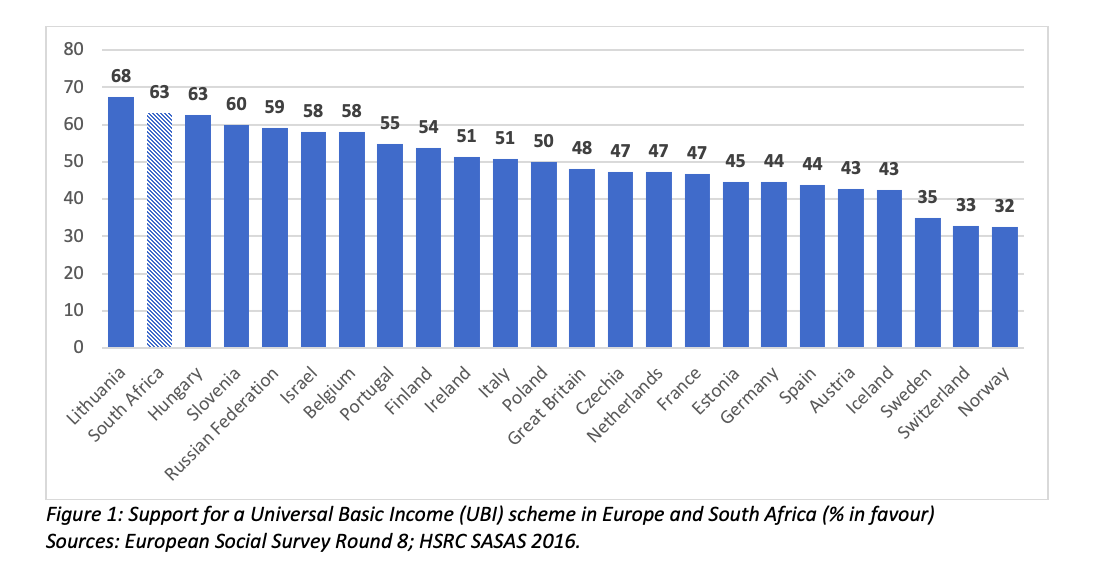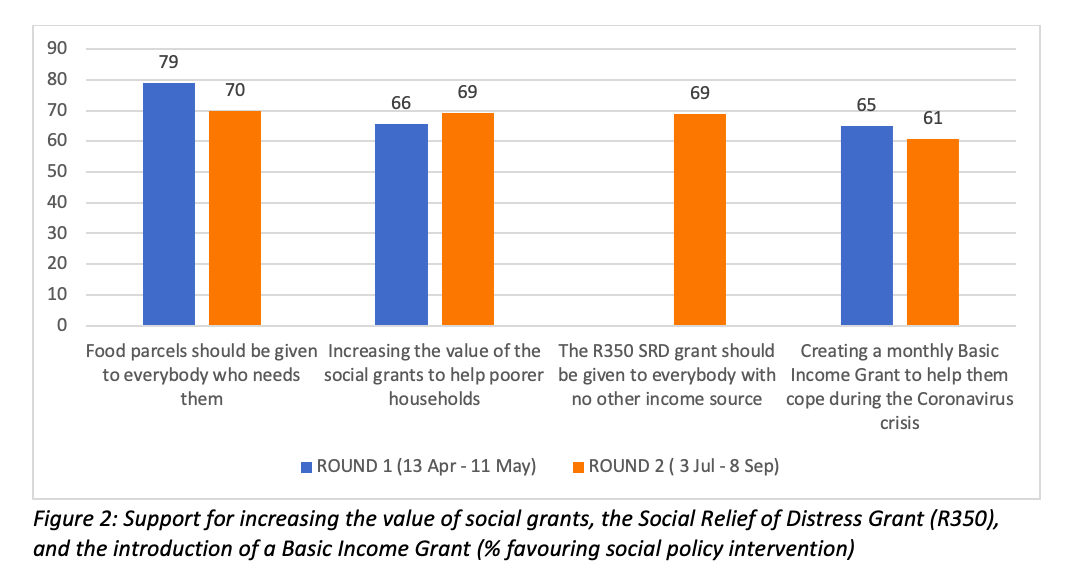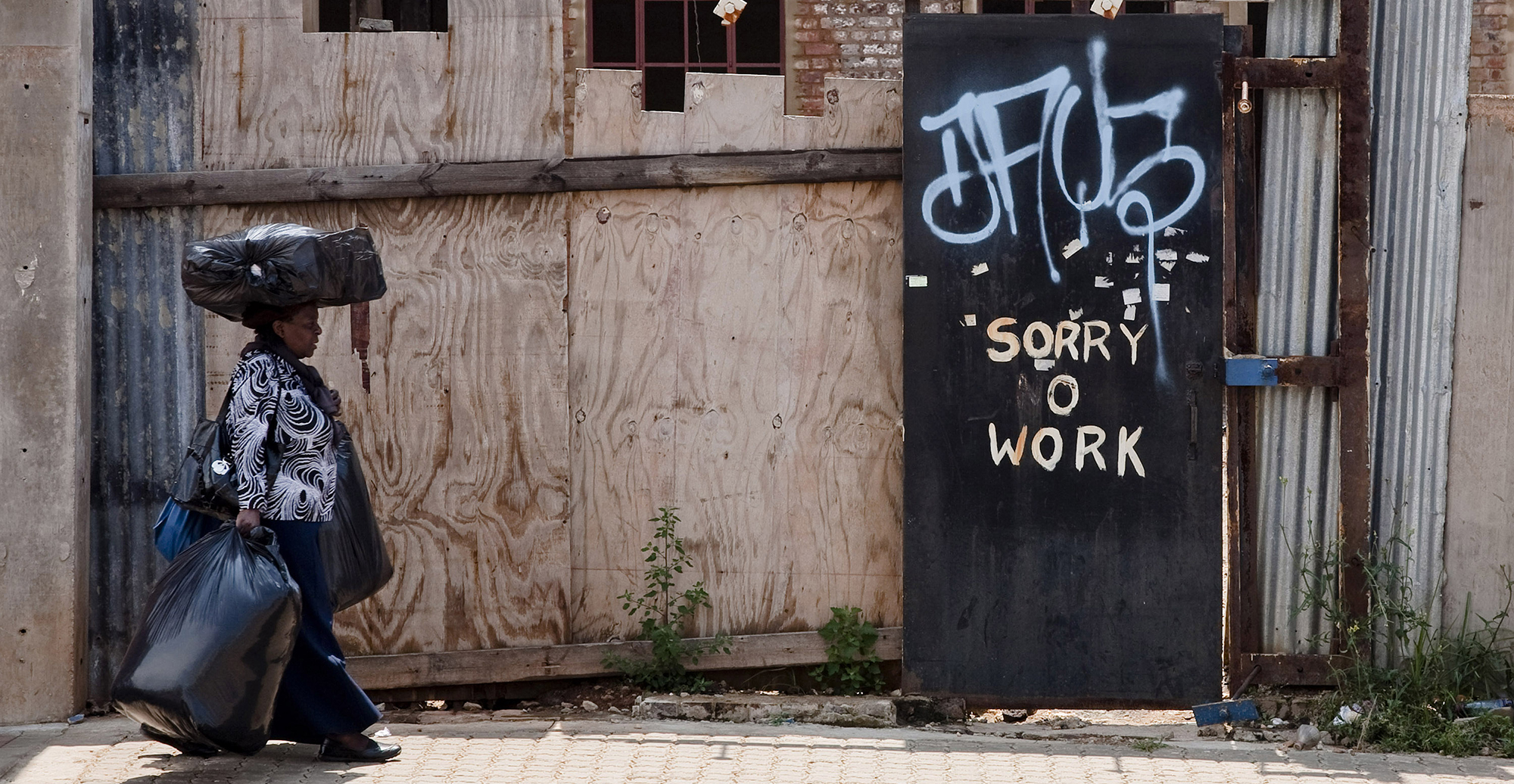For more than two decades, successive South African administrations have been reluctant to support a basic income grant/guarantee (BIG) even for chronically poor unemployed citizens. However, a milestone occurred in April 2020 with the introduction of a monthly R350 Social Relief of Distress (SRD) grant to assist South Africans during the Covid-19 pandemic and national lockdown.
Evidence from the University of Johannesburg (UJ)/Human Sciences Research Council (HSRC) Covid-19 Democracy Survey, led by Kate Alexander, Chair of Social Change (UJ), and Prof Narnia Bohler-Muller, Divisional Executive HSRC, suggests that a large proportion of South Africans support a regular SRD grant and food parcels to alleviate poverty. Many favour making such a grant permanent. The HSRC’s South African Social Attitudes Survey (SASAS) series also illustrates sustained support for such a grant.
Furthermore, a BIG can be financed without raising taxes.
What’s the BIG idea?
The idea of a BIG is based on three main features: (a) Universal – it is paid to all without a means test; (b) Individual – designed to cater to individuals; and (c) Unconditional – no requirement to seek or do paid work.
Supporters of a BIG argue that it provides a regular and predictable income as a universal and unconditional entitlement, thereby reducing poverty and inequality more effectively than means-tested schemes, and mitigating the possible displacement of jobs by technology.
BIG also has the potential to promote an individual’s dignity and human rights by giving them the opportunity to undertake different forms of valuable work not rewarded by the market, such as domestic work, care work and volunteering.
Unemployed South Africans between the ages of 18-59 have typically been excluded from social protection measures, but StatsSA reported that the number of people in this category increased by 2.2 million with the implementation of the lockdown and the resulting downsizing or closing of businesses.
Almost two decades ago, the 2002 Taylor Committee said that provision of a universal or basic income grant of R100 per person per month, if combined with the child support grant (CSG), would substantially reduce poverty.
Regrettably, these proposals were not embraced by policymakers and the business sector at the time. It was argued that economic growth should be prioritised, thereby improving employment and income generally rather than increasing welfare payments. Some economists doubted its affordability and emphasised that social assistance does not contribute to economic growth.
However, economic growth hasn’t taken place, while a BIG does provide an economic stimulus, a welfare lifeline, greater access to work opportunities and a mechanism to break the intergenerational cycle of poverty.
The International Monetary Fund supports the progressive rollout of a BIG, with its studies showing that a payment of R1,584 (based on 2012 data) to all individuals per annum could reduce poverty by 10.8%. UNESCO recently emphasised that “universal access to social services and nationally appropriate social protection can reduce poverty, inequality and social exclusion, and promote inclusive economic growth. Social protection is an investment in people and thus in long-term social and economic development”.
In 2018, the South African Human Rights Commission recommended that National Treasury and the Department of Social Development (DSD) assess the viability of a BIG, and draft a roadmap for a pilot study.
In addition, estimates from Wave 2 of the NIDS-CRAM survey indicate that the Covid-19 SRD grant had reached 4.3 million people as of the time of the survey (13 July to 13 August 2020), providing some indication of the scale of need and interest in the grant, and with a “progressive” and “relatively pro-poor” impact.
The BIG appeal: Poverty, inequality, a missing middle and the right to social protection
Young and middle-aged adults lacking skills relevant to available employment opportunities live without work most of the time. Consequently, they are disproportionately exposed to shocks and stresses, such as those stemming from Covid-19 and the hard lockdown response. Youth (aged 15 to 34) remain particularly vulnerable, with an unemployment rate of 40.1% (20.4 million), which is 11% above the national average.
Furthermore, South Africans aged 18 to 59 have no access to any form of social security, regardless of employment status or level of impoverishment and hunger. The scale of poverty and deprivation within this large cross-section of society has profound impacts “not just on their wellbeing, but on the living conditions of their families and community, and ultimately impacts on the growth and stability of the country”.
A necessary and enshrined right to social protection
The Constitution was designed to deliver a substantively better quality of life for all, particularly for the poorest and most vulnerable in society. Section 27(1) of the Bill of Rights provides that everyone has the right to have access to social security, including appropriate social assistance. Section 27(2) requires the state to take reasonable measures, within its available resources, to achieve the progressive realisation of this right.
Despite enactment of the Social Assistance Act 59 of 1992 to give legislative effect to the constitutional promise, almost half of South Africans are unemployed or live in poverty.
The South African Human Rights Commission concluded in 2018 that “South Africa has failed to discharge its international and national obligations regarding the provision of social assistance to those most in need”.
Public support for a basic income pre-pandemic
The 2016 round of SASAS replicated a question from the European Social Survey on support for the introduction of a UBI scheme (Figure 1), which is similar to a BIG. The percentage supporting the scheme varied from 32% in Norway to 68% in Lithuania.
Support was strongest in highly unequal countries (such as Lithuania and Hungary), and weakest in the equalising welfare states of Norway and Sweden, indicating that a basic income scheme is regarded as a means of improving social welfare rather than a substitute for performing welfare systems.
As a highly unequal society, South Africans demonstrate a comparably high degree of support for basic income support. This signals a high degree of legitimacy vested in the developmental state and a desire to expand existing social protection arrangements to improve living conditions.
 Figure 1: Support for a Universal Basic Income (UBI) scheme in Europe and South Africa (% in favour) Sources: European Social Survey Round 8; HSRC SASAS 2016.
Figure 1: Support for a Universal Basic Income (UBI) scheme in Europe and South Africa (% in favour) Sources: European Social Survey Round 8; HSRC SASAS 2016.
Perceptions of Covid-19 social protection measures
Evidence from the online Covid-19 UJ/HSRC democracy survey, which was administered using the #datafree Moya Messenger app on the #datafree biNu platform, shows that there is robust public support for key social protection measures implemented during the Covid-19 pandemic (Figure 2).
Two rounds of surveying were undertaken: the first between 13 April and 11 May 2020, during lockdown Level 5 (12,312 respondents); the second between 3 July and 8 September 2020, during Levels 3 and 2 (7,966 respondents). In both rounds, participants were asked to select from 13 policy measures they would support.
 Figure 2: Support for increasing the value of social grants, the Social Relief of Distress Grant (R350), and the introduction of a Basic Income Grant (% favouring social policy intervention). Note: Support for the SRD grant was asked only in Round 2 of the survey.
Figure 2: Support for increasing the value of social grants, the Social Relief of Distress Grant (R350), and the introduction of a Basic Income Grant (% favouring social policy intervention). Note: Support for the SRD grant was asked only in Round 2 of the survey.
A broad-based consensus?
How unified or divided are South Africans in the level of support for these social protection measures, including increasing grant values, the SRD, and introducing a BIG?
The core message emerging from the results in survey rounds 1 and 2 is that, despite varying degrees of support, these social protection measures receive fairly broad-based support across a range of socio-demographic groupings. Support for raising the value of social grants ranged between 60% and 80% in round 1 and between 51% and 80% in round 2.
Across all the traits examined, the share favourable towards this policy option only fell below the 60% mark among those earning more than R5,000 per month. Similarly, support for the R350 per month SRD was favoured by sizable majority shares, ranging from 59% to 75%, with income-based differences the most distinctive.
Finally, support for the BIG ranged between 56% and 80% in round 1 and 50% and 75% in round 2. The lowest levels of support in this instance were among those earning more than R20,000 per month and the self-rated non-poor (both 50%). While noting these class-based (and other) differences in the depth of support for the policies, the level of support across society and over time is fairly high for redistributive social policies of this type.
Addressing the BIG debate
In policy discussions on the possible introduction of a BIG in South African, two critical arguments are commonly raised; namely, that it would: (a) constitute a negative incentive for people to seek employment (the dependency argument), and (b) that implementation would be too expensive (the affordability argument).
The dependency fallacy
The first argument assumes that people will suddenly stop seeking employment when they receive the benefit. A similar argument was often levelled against social grant beneficiaries, which has proven to be false.
Such stereotypical representations are inaccurate and decisive action is needed to make a difference in the lives of vulnerable people, often confronted with harsh living conditions and antagonistic community and labour market environments.
The evidence from our study suggests strong, albeit mixed, support across different socioeconomic strata in favour of the SRD and a longer-term similar grant. However, financing needs to be sustainable.
Financing a universal income grant
Government will find it difficult to fund the SRD grant as part of a permanently expanded social protection programme. An already weak economy has suffered a significant setback from the various lockdown measures. In addition to losing excise taxes due to the extended bans on alcohol and tobacco, government has incurred large debts as it has been compelled to borrow to address the many needs arising from the health and socioeconomic crises.
However, a recent policy paper by the Black Sash argues that much depends on the level of the grant: whether it is universal, and whether it is phased in. In addition, the current discretionary risks and costs of administering a range of individual means-tested grants could be dramatically reduced by means of a universal basic income support grant that is then partly clawed back through ordinary income taxes on wealthier taxpayers.
Where to now?
Chronic unemployment and poverty have deepened despite numerous policy and legislative interventions. Over and above Covid-19 impacts, they amount to a chronic disaster that is unravelling our wellbeing and social cohesion, and weakening our constitutional democracy. Determined and effective prevention of squandered public finances and minimising corruption, aided by real-time transparency and multi-stakeholder oversight of public procurement expenditure, offer an efficient means to fund a pilot BIG.
It is recommended that government should seriously consider continuing the SRD grant in the medium term by rolling it out as a pilot to the poorest in the country, regularly reassess the process, and gradually expand access to those most in need, particularly those in the 18-59 age group – and finance a BIG by ensuring sound, accountable governance and financial stewardship, including using the Auditor-General’s proactive and preventative checks and balances to ensure that mismanagement and corruption are deterred within all organs of state and across society. DM
Yul Derek Davids and Mokhantšo Makoae are research directors, Benjamin Roberts is chief research specialist, and Gary Pienaar and Tim Hart are senior research managers in the Developmental Capable and Ethical State (DCES) research division of the HSRC.




 Figure 2: Support for increasing the value of social grants, the Social Relief of Distress Grant (R350), and the introduction of a Basic Income Grant (% favouring social policy intervention)
Figure 2: Support for increasing the value of social grants, the Social Relief of Distress Grant (R350), and the introduction of a Basic Income Grant (% favouring social policy intervention)